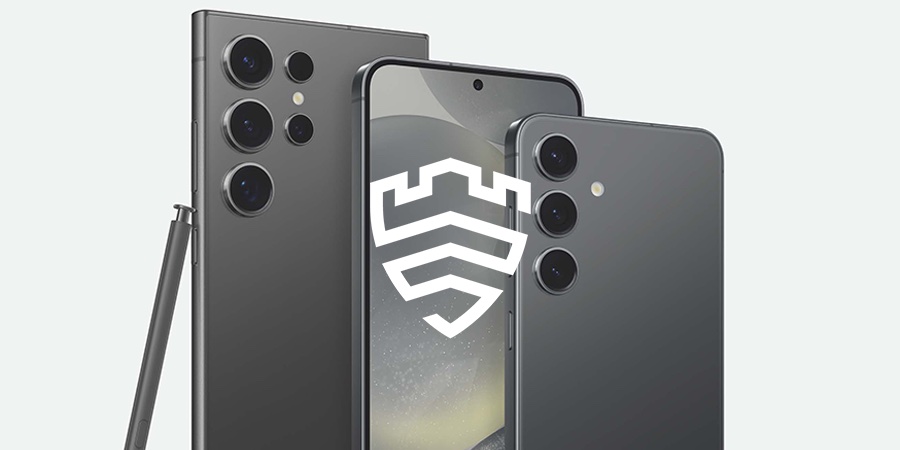Artificial intelligence (AI) can do amazing things in the workplace. It can accelerate information gathering, supercharge marketing, simplify data analysis, optimize resource allocation and help guide decision making. However, for all the good that it does, it also presents some serious concerns. Accuracy is, of course, one. Ethics are another. But perhaps the biggest risk is security. Protecting and patrolling the data entered into and received from AI is paramount.
Samsung is at the forefront of bringing AI to business-ready mobile devices. With that comes a responsibility to develop the next generation of robust security tools built for AI, which the company is clearly and actively embracing. Released at the January 2024 Galaxy Unpacked event, Galaxy S24 Series debuts Galaxy AI while incorporating new and proven security measures alike in Samsung Knox to not only deliver the power of AI but also safeguard it.
Here are the key areas that business leaders must secure when implementing AI in the workplace, and how Samsung’s solutions help achieve the necessary level of security that might otherwise go overlooked.
1. Data security
Public AI applications handle and house vast amounts of data with a third-party provider, increasing both the risk and ramifications of data breaches if proper security measures aren’t in place locally. If a data breach occurs in an application that a team is using in their daily work, the customers’ or clients’ data is at risk of being exposed, creating additional damage control and reputation management. The proliferation of mobile devices and remote work environments further complicates data security, as it introduces additional entry points for potential threats. This isn’t meant to be a scare tactic; it’s just the nature of adopting AI as a business tool, but one that needs to be addressed.
Samsung Knox includes a comprehensive suite of data security solutions designed to protect data at every level. File-based encryption offers separate encryption keys by default, or there’s the ability to store materials in a Secure Folder using independent credentials. Secure Wi-Fi adds protection to public Wi-Fi networks by encrypting internet traffic and blocking tracking apps. Samsung Auto Blocker can stop the side-loading of apps from unknown sources, even if a user accidentally approves it. It can also block USB updates to prevent malicious software from being installed. Google Play Protect regularly scans downloaded apps to detect malware and spyware. And in Galaxy AI, Google’s Secure AI Framework compliance ensures security best practices backed up with strict AI data controls and storage for enterprise security, safety and privacy.
2. Data architecture
Data security is only one piece of the puzzle. Equally important is data architecture. One of the key challenges in data architecture is the need to effectively manage and organize data across different platforms and environments. As businesses adopt AI applications, IT teams find themselves taking on an entirely new dimension of data stored across various devices, cloud services and applications. Hybrid and remote workplaces make it difficult to maintain consistency, integrity and security across all data sources and devices.
A fundamental concept in data architecture is the separation of on-device and cloud data. On-device data refers to information stored locally on individual devices. Cloud data resides in remote servers accessible over the internet. On both sides, tight controls on privilege, data storage and data access are essential. With Samsung’s Knox Platform for Enterprise built into Galaxy devices, IT teams have robust and flexible mobile device management (MDM) and enterprise mobility management (EMM) controls at their fingertips. Meanwhile, Galaxy AI data is processed only after application privilege verification. Data access is restricted only to authorized applications, and no data storage occurs during the process. Android Work Profile also separates work and personal data on a device with dedicated work and personal profiles, so businesses can maintain security and control over company data while respecting employee privacy.
3. On-device protection
When it comes to on-device security in Galaxy S24 Series, the Galaxy AI experience itself is secure with no extra steps required and additional on-device controls to tap into thanks to Samsung Knox. At the core of Knox Platform for Enterprise lies Knox Vault, a secure storage space designed to protect sensitive data from unauthorized access. Samsung Knox Vault shields your most secure data from the Android OS and applications with a dedicated security chip, secure processor and isolated secure memory, ensuring that confidential information remains protected, even in the event of a device compromise.
Samsung goes beyond Knox Vault to provide additional layers of on-device protection. Secure Boot, for instance, verifies the integrity of device firmware during startup, thwarting any unauthorized modifications that could compromise security. Permission Manager allows administrators to fine-tune app permissions, ensuring that only authorized applications can access sensitive data. SmartThings Find provides a safety net for lost or stolen devices. Aside from assisting with finding a lost device, it can remotely lock, erase or display customized messages on the lock screen. With Knox Platform for Enterprise, businesses can confidently deploy AI applications on mobile devices, knowing that on-device data is protected at every step.
4. Cloud strategy
The cloud offers unparalleled benefits for businesses but also has potential drawbacks that become magnified when sensitive data crosses paths with AI. On one hand, leveraging cloud infrastructure for AI processing provides scalability, flexibility and access to vast computing resources. It enables businesses to execute complex AI algorithms, analyze large datasets and deploy AI applications with ease, regardless of their computational requirements.
With that said, reliance on the cloud for AI processing introduces challenges and concerns once again relating to data security. Transmitting sensitive data to the cloud for processing exposes it to potential interception, unauthorized access and data breaches. Businesses in highly regulated industries may encounter issues with compliance regarding where data is stored and processed. So, what can be done to mitigate the risk?
Businesses can considers adopting a strategy that involves disabling cloud processing for sensitive AI tasks. That way, they can take control of cloud-based AI data. Samsung offers a solution to enable businesses to disable cloud processing seamlessly through its Knox Service Plugin. Enabling the “Allow process data only on device” policy will force on-device AI data processing locally with no reliance on the cloud. This approach provides greater flexibility and control over AI workflows while maintaining data privacy and security. IT admins can access Knox Service Plugin on major EMMs, including Microsoft Intune, VMware, Knox Manage and others.
Security: The AI X factor
Protecting the business as it ventures into AI requires the latest hardware and software built with the necessary security features from the ground up. The answer isn’t to hide from AI. It’s to embrace and pursue it while putting the right pieces in place to secure it. With Galaxy S24 Series, Galaxy AI and Samsung Knox, businesses have everything they need to go all in on AI.
Sign up for updates on Galaxy S24 Series and enjoy exclusive volume pricing, bulk trade-in discounts, free shipping and more with a Samsung Business Account, including 50% off Samsung Care+ and a free case.








